Does Using AI Voice Changers Infringe on Others' Rights?
Artificial intelligence has revolutionized the way we interact with audio and video-AI voice changers being one of the most viral examples. From TikTok memes to YouTube parodies, voice-cloning technology is everywhere. Popular personalities like Donald Trump, Joe Rogan, and Elon Musk have all been subject to AI-generated audio content, sometimes for satire, and other times for manipulation.
As fun and entertaining as these tools can be, they also raise serious questions: Is it legal to use an AI voice changer to mimic someone else? Does voice cloning infringe on voice identity rights or cross ethical boundaries?
In this article, we'll explore the legal and moral risks of using AI voice changer tools, including potential misuse of AI-generated voices, impersonation, and ethical considerations.
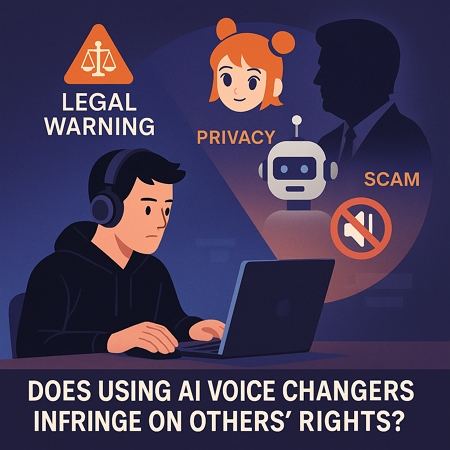
Part 1. What Is an AI Voice Changer?
An AI voice changer is a software tool that uses artificial intelligence-particularly deep learning and speech synthesis-to modify a person's voice in real time or from recorded audio. These tools can simulate accents, genders, ages, and even mimic specific celebrities or fictional characters.
Use cases include:
- Entertainment: Real-time voice filters for livestreaming or voiceovers
- Gaming: Creating distinct in-game character voices
- Content creation: Parody videos, voiceovers, and AI storytelling
While creative and fun, these tools also have a darker side when misused, especially in impersonation and fraud.
Part 2. Legal Risks of AI Voice Changers
1. Voice Identity Theft & Impersonation
In legal terms, voice likeness-like your image or name-is a part of your right of publicity, which protects personal identity from unauthorized commercial use.
- In the U.S., many states recognize voice as a protectable attribute under the Right of Publicity. In a landmark case, singer Bette Midlersued Ford Motor Company for using a voice impersonator in an ad, and the court ruled in her favor, acknowledging voice as a distinct identity trait.
- In the EU, under GDPR, biometric voice data is considered sensitive personal information, which means AI voice cloning without consent can be a data privacy violation.
Real-world examples:
- AI-generated speeches mimicking Barack Obama and Donald Trump circulated online, sparking debates over political manipulation and consent.
- Unauthorized AI ads using cloned voices of celebrities for commercial gain have led to takedowns and legal threats.
2. Fraud & Malicious Misuse
AI voice changers are increasingly being used for scams and fraud:
- According to the Federal Trade Commission (FTC), voice-based scams using AI increased by over 300% in the past year, with criminals using cloned voices to impersonate family members or executives in phishing attacks.
- Some U.S. states have introduced the Synthetic Media Accountability Act, criminalizing the malicious use of synthetic media, including AI-generated voices in misleading or harmful contexts.
The legal consequences can be severe, especially if the voice cloning causes reputational harm or financial loss.
3. 3 Parody vs. Defamation
Parody is often protected under "fair use," especially in satire or entertainment-but there's a fine line.
- If AI voice content implies false statements or damages a person's reputation, it could cross into defamation territory.
- A notable case involved a YouTube influencer who used an AI-generated celebrity voice in a mock scandal video and was later sued for reputational harm, even though the video was labeled as "parody".
Understanding these boundaries is crucial for anyone using AI voice changers in public content.
Part 3. How to Use AI Voice Changers Responsibly
With great power comes great responsibility. Ethical AI voice tools must incorporate safeguards to prevent abuse. HitPaw VoicePea includes several responsible-use features:
- User Agreement specifically forbids using the tool for impersonation, fraud, or illegal purposes.
- Watermark tracing technology can help detect misuse and identify AI-generated voice content.
- In-product warnings remind users: "You must obtain legal consent before cloning any real person's voice."
Legitimate use cases:
- Content creators can use voice filters to bring fictional characters to life.
- Game developers and streamers often use real-time voice effects for entertainment.
- Educators and YouTubers can create multilingual or narrative content using ethical AI voices.
HitPaw VoicePea is a powerful and easy-to-use AI voice changer designed for creators, gamers, streamers, and everyday users who want to experiment with voice effects without compromising ethics or privacy.
Key Features of HitPaw VoicePea:
- 200+Real-Time Voice Filters: Includes voices like anime girl, cartoon character, robot, monster, ghost, deep male, baby, alien, and more.
- Gaming Integration: Compatible with Discord, Steam, OBS, Zoom, and other real-time platforms.
- Privacy-Focused AI Engine: Local voice processing or encrypted upload to protect user data.
- Creative Presets, Not Celebrity Clones: Focuses on fictional and fun voices to avoid legal/ethical violations.
- Custom Voice Options: You can fine-tune pitch, speed, tone, and modulation to create your own unique voice profile.
How to Use HitPaw VoicePea: Step-by-Step Guide
Step 1: Download & Install
Download and install HitPaw VoicePea according to your system. Follow the on-screen instructions to install the program.
Step 2: Set Up Your Microphone
Launch HitPaw VoicePea, Go to Settings > Audio Input and select your microphone. Test your mic to ensure it's being recognized.

Step 3: Choose a Voice Effect
From the left panel, select a voice effect (e.g., Anime Girl, Robot, Deep Male). You can preview effects in real time.
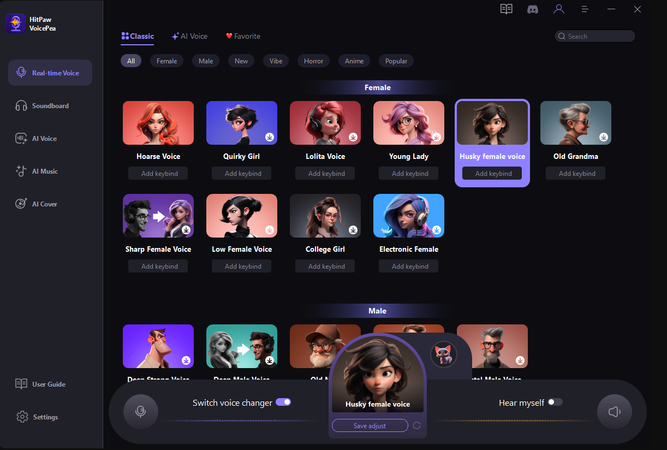
Step 4: Adjust Parameters
Use sliders to tweak pitch, timbre, reverb, and more. You can save your favorite custom voices for future use.
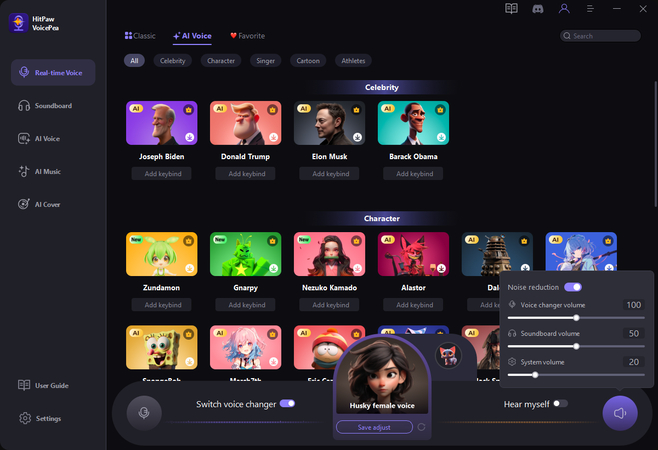
Step 5: Integrate with Your Platform
Open your desired app (e.g., Discord, OBS, Zoom). Set your microphone input to "HitPaw Virtual Audio Device." Speak and enjoy real-time AI voice effects!
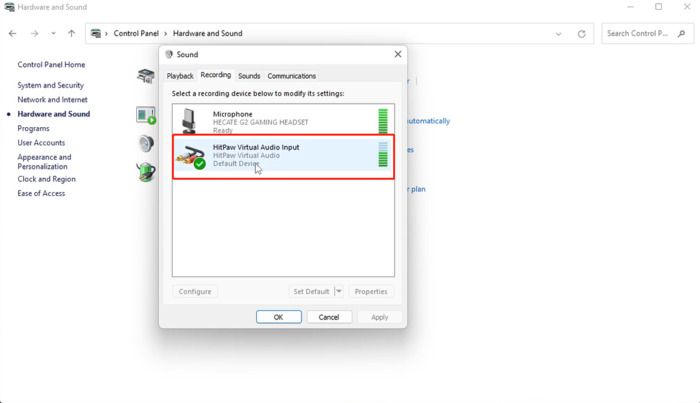
Step 6: Use It Responsibly
Always respect others' voice rights. Do not impersonate real individuals without consent.
Wrapping It Up
AI voice changer technology is here to stay, offering powerful tools for storytelling, entertainment, and interaction. However, with this innovation come serious responsibilities.
Whether you're experimenting with character voices or building content for millions of viewers, understanding the legal and ethical landscape of AI voice use is essential.
HitPaw VoicePea empowers you to explore your creativity-safely, ethically, and legally.







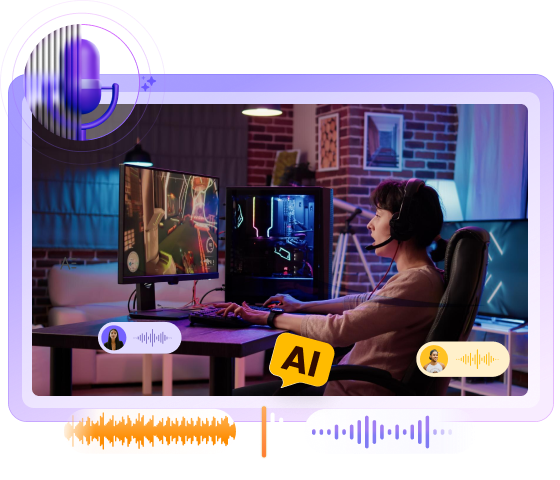
 HitPaw Univd (Video Converter)
HitPaw Univd (Video Converter) HitPaw VikPea (Video Enhancer)
HitPaw VikPea (Video Enhancer)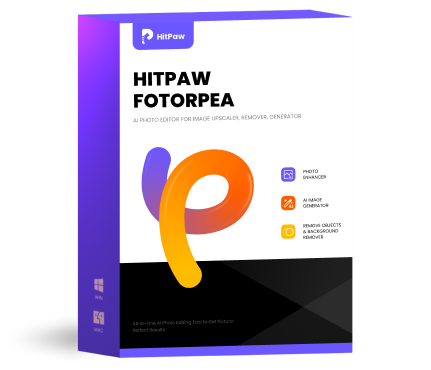 HitPaw FotorPea
HitPaw FotorPea




Share this article:
Select the product rating:
Daniel Walker
Editor-in-Chief
This post was written by Editor Daniel Walker whose passion lies in bridging the gap between cutting-edge technology and everyday creativity. The content he created inspires the audience to embrace digital tools confidently.
View all ArticlesLeave a Comment
Create your review for HitPaw articles